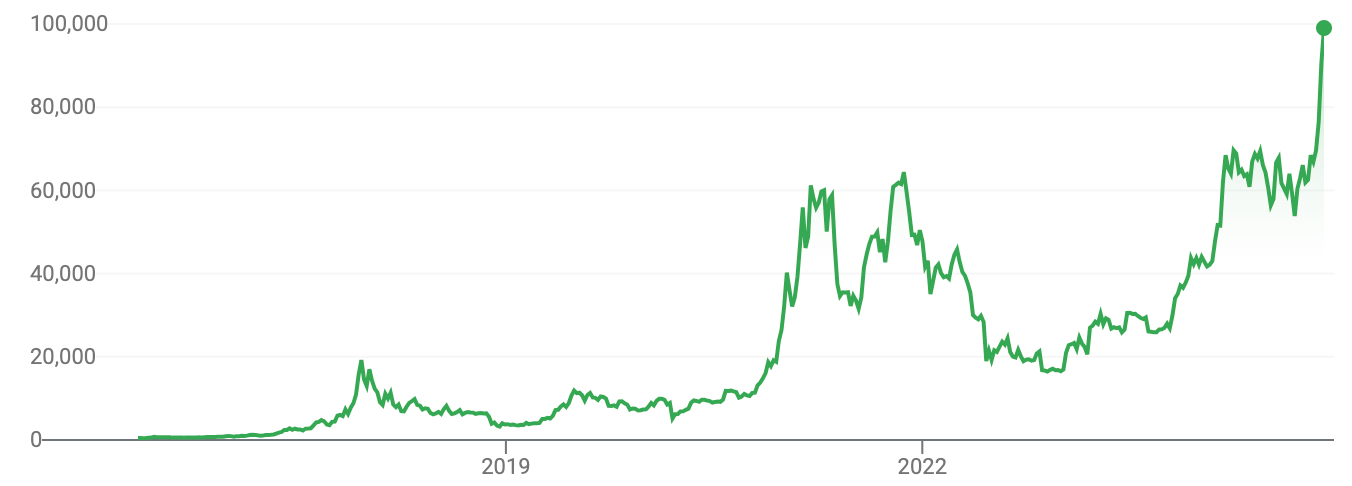Gradually, Then Suddenly
How people understand bitcoin:
Gradually, then suddenly.
How the price of bitcoin moves:
Gradually, then suddenly.
In Hemingway’s The Sun Also Rises, a character describes the process of going broke as “gradually and then suddenly.” The saying has since been adopted by the bitcoin community.
How inflation occurs:
Gradually, then suddenly.
Hyperinflation
In five short years, Nigeria’s inflation rate has ballooned from low double digits to upwards of 33%. That’s nothing compared to the likes of countries like Venezuela, however, where the government stopped publishing inflation rates as hyperinflation got so bad.
At its peak, inflation rates soared to over 2,000,000 percent! Inflation, like debt, and like many activities one engages in, is manageable until it isn’t.
BTC Adoption
Gradually, then suddenly.
If you’re newer to bitcoin, I’m here to tell you that it’s about much more than Western investors speculating on price action and generating wealth.
Bitcoin is a much needed tool for financial optionality in places where the local currency or government and central banks are otherwise unreliable.
El Salvador
El Salvador has led the charge in Latin America, adopting a government-backed bitcoin strategy. President Nayib Bukele’s approval rating is through the roof as he’s transformed the country into a safer place and worked tirelessly to create a financial cushion as the country was previously reliant on the US dollar without its own local currency for the last two decades.
In 2021, El Salvador made bitcoin legal tender. Since then, the country has also amassed a government-owned bitcoin position of nearly 6,000 BTC worth $600,000,000 as bitcoin prices reached $100,000 this week.
The World Bank and International Monetary Fund have been critical of the country’s decision to adopt bitcoin and have threatened to withhold grants and funding if they continue down this path. Moody’s has downgraded El Salvador’s credit rating, citing bitcoin is a risk factor.
As legacy international powerbrokers attempt to wield their authority over small countries previously dependent upon them for funding, President Bukele remains steadfast in their approach.
Bhutan
If you’ve never heard of the Kingdom of Bhutan, it’s a small landlocked Buddhist country in the Himalayas between China and India with a population of less than one million. With an abundance of hydroelectric power, the country has been mining bitcoin 100% carbon-free with partner companies.
Bhutan now ranks among the top four countries with government bitcoin holdings. Their position is twice the size of El Salvador’s at just over 12,000 BTC worth $1.2 billion and that’s after having recently sold some for profit.
Gradually
Bitcoin adoption began with the individual.
Satoshi Nakamoto, the creator of bitcoin, started out by himself. He gathered feedback from other computer programmers and cypherpunks online then worked one on one with folks like Hal Finney to get the project off the ground.
Bitcoin started to gain traction in niche online communities of libertarians looking for alternative approaches to money and state. Computer programmers contributing to online privacy work in the early days of the internet, the cypherpunks, gravitated towards it as a potential medium to protect financial privacy rights in a new frontier that was being commoditized by big tech.
Then, bitcoin spilled out into rogue online marketplaces where people would trade funds for both legal and illegal goods and services. After that, it was clear that bitcoin worked and risk-tolerant investors took a gamble on building out the first bitcoin exchanges and payment provider companies. Some of these, like Coinbase are still around today.
Keep reading with a 7-day free trial
Subscribe to Bitcoin Binge to keep reading this post and get 7 days of free access to the full post archives.




